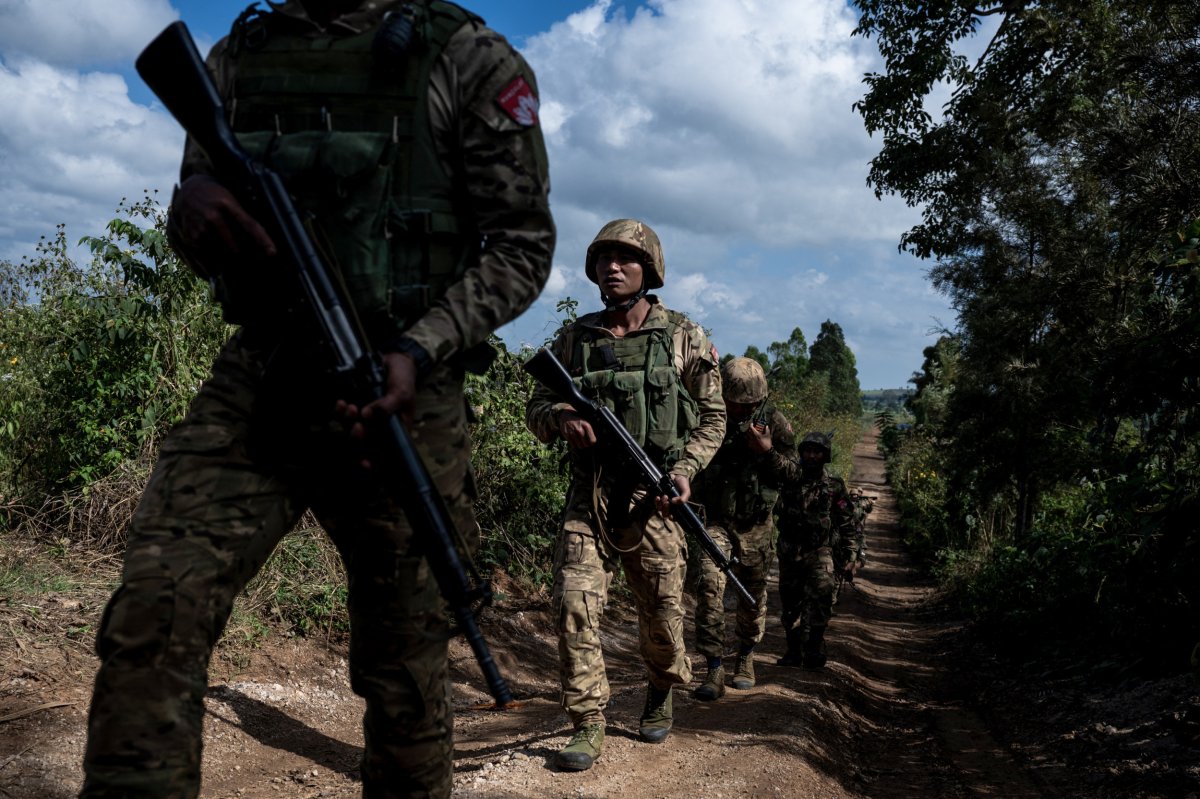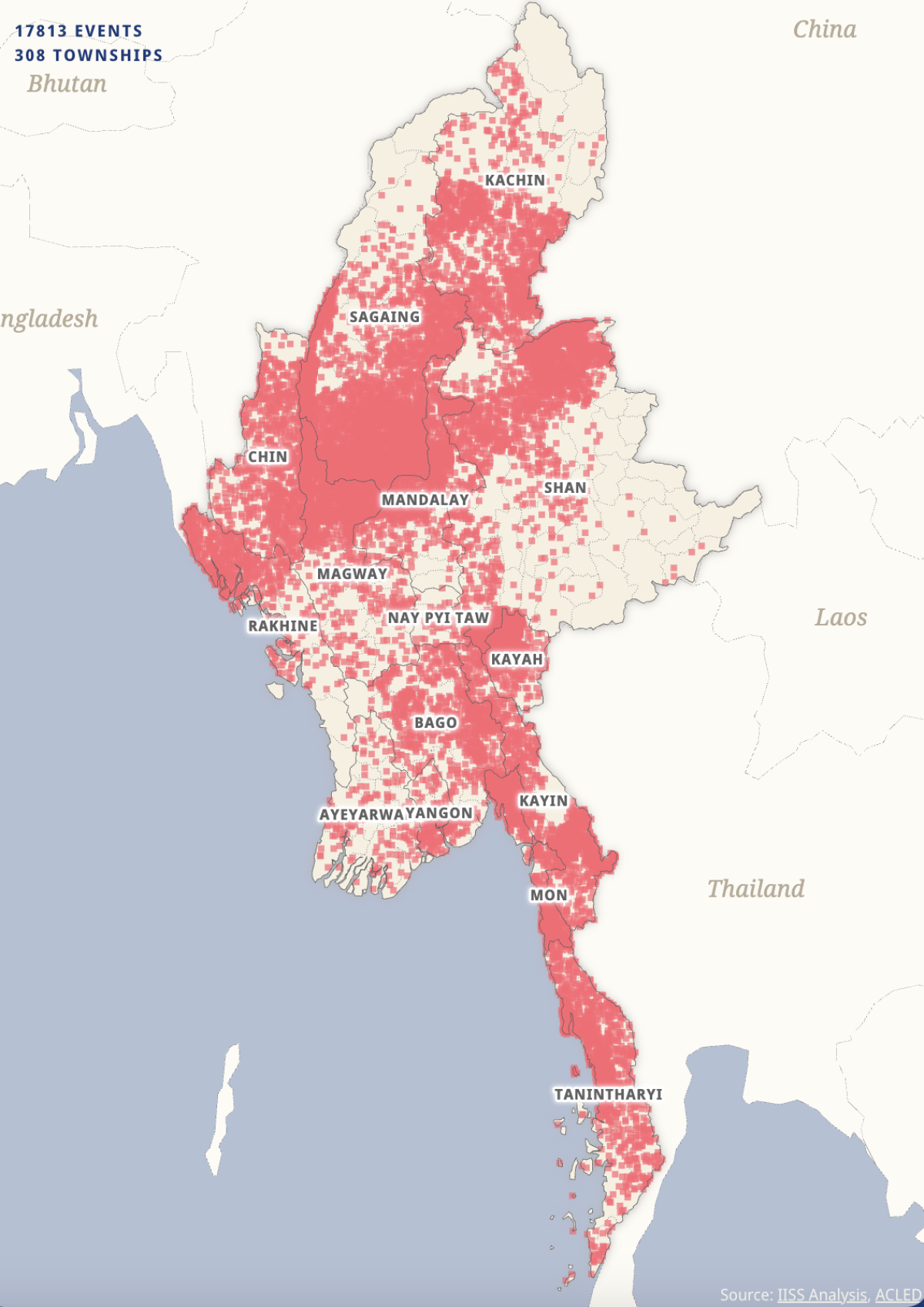Matthew Tostevin
Unmarked by global street protests or quarrels over funding in Congress, three years of war in Myanmar have killed an estimated 50,000 people since the army seized power in the Southeast Asian country.
The Armed Conflict Location and Event Data Project (ACLED) ranks Myanmar as the most violent of 50 wars it monitors around the world, noting the hundreds of small militias that have formed to fight the junta since the February 1, 2021, coup against elected leader Aung San Suu Kyi.
The project told Newsweek it estimates a death toll of at least 47,000 in violence in Myanmar since then, including at least 8,000 civilians, but says that figure is conservative and that the total death toll could well be another 12,000 higher, including a further 2,000 civilian deaths.
"The number of attacks by the military over the years has been massive, but there has been kind of an increase with the rebels taking over more and more territory at the end of the year," Andrea Carboni, ACLED's head of analysis, said in an interview.
Myanmar's Information Ministry did not answer phone calls to seek comment.
Fighting in Myanmar intensified late last year as an alliance of insurgent groups made major gains against the forces of junta leader Min Aung Hlaing, who is under Western sanctions and gets weapons principally from Russia and China. The United Nations says some 2.3 million people have been displaced by the war.
Despite the human impact, the war has drawn much less attention than Ukraine or Gaza either from Western governments or from activists and protesters.
While the death toll reported in Ukraine has been higher than that in Myanmar since Russia's full-scale invasion in February 2022, and fighting between Israel and Hamas has been more intense since the Palestinian group's attack on Israel set off the latest round of conflict there on October 7, Myanmar's position also makes it of less strategic interest to the United States and other Western powers than Europe or the Middle East.
Resistance
"Myanmar's people are exhausted and no longer looking externally for a solution to their immediate problem. They have rallied and pushed on with their resistance campaign from inside the country. This is the only reason why we are even able to say that there is still hope, and they are the reason for what appears a possible breakthrough recently in weakening the military's grip in some parts of the country," the Human Rights Watch nonprofit's Myanmar researcher Manny Maung told Newsweek.
"Myanmar's economy is in a shambles and the military is continuing to commit human rights abuses that include mass killings, arbitrary detention, crimes against humanity and war crimes. Rather than feeling the pressure from the international community to stop its abuses, the military junta appears emboldened to commit ongoing human rights violations," Maung said.

Members of the Mandalay People’s Defense Forces patrol near the front line amid clashes with Myanmar's military junta in northern Shan State on December 10, 2023. An estimated 50,000 people have been killed in three.
Google Trends shows how much less interest there has been in Myanmar compared to Gaza or Ukraine. An index of worldwide searches over the past month for Ukraine varied between 83 and 100 and for Gaza between 30 and 46, but for Myanmar it was effectively zero.
"Day by day, the junta in Myanmar mercilessly slaughters its own people without consequences," Thinzar Shunlei Yi, advocacy coordinator with the grassroots coalition ACDD told Newsweek. "The global community, unfortunately, turns a blind eye, giving attention to other urgent conflicts. This isn't just 'internal affairs'; it's a blatant display of ignorance, particularly from hypocritical leaders in our neighboring countries, especially China and Russia."
U.S. support for both Ukraine's war and for Israel has come under increasing domestic pressure, with some critics questioning the cost of the former and others Israel's conduct in its assault into the densely populated Gaza Strip.
Western countries have largely delegated diplomatic efforts over Myanmar to the Association of Southeast Asian Nations regional group, but the junta has been dismissive of its attempts to address the crisis.
"Myanmar is fiendishly complex and its rulers do not respond to more traditional diplomatic and other overtures to engage in dialogue," Laetitia van den Assum, a former Dutch ambassador to Thailand and Myanmar, told Newsweek. "You can engage the junta, but only if you accept its terms and ditch your own. That also explains its isolation."
ACLED's Carboni said that the risk of worsening conflict had increased as an embattled army was forced onto the defensive and became increasing reliant on bombing and shelling.
"Air strikes and shelling are typically some of the most lethal forms of violence simply because they are much less precise, and of course they often happen in populated areas or in rebel-held villages even just to depress populations to subdue them rather than to defeat them on the field," he said.

A screen grab of a Myanmar conflict map maintained by the International Institute of Strategic Studies shows attacks and armed clashes across the country since mid-2020. Analysts at the Armed Conflict Location and Event Data.
Myanmar's army seized power after Suu Kyi, now 78, trounced a pro-military party in elections it said were irregular. The coup cut short a tentative experiment with democracy after decades of army rule. The junta sentenced Suu Kyi on charges for which she is serving combined jail sentences of 27 years, and which her supporters say were trumped up.
Although the army promised elections, it has repeatedly extended a state of emergency as it has come under growing military pressure from enemies including an underground National Unity Government and its People's Defense Forces as well as ethnic militia groups.
A Myanmar conflict map maintained by the International Institute of Strategic Studies, a British think tank, shows conflict across nearly all populated areas.
"We pledge to persist in our revolutionary endeavours, maintaining unwavering cooperation and collaboration with our allied revolutionary forces," the National Unity Government and allied forces said in a statement on Wednesday.
No comments:
Post a Comment